Even on a rainy day, one of the things that the Fine Art Museums of San Francisco have in common is that they both have an interesting view of the city, as well as a distinctive view on art. A ticket to either museum is good to visit both museums on the same day.
The Views Outside
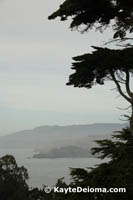 The Legion of Honor has commanded its impressive view from Lincoln Park since Alma de Brettville Spreckles gave it to the people of San Francisco in 1924 in honor of the Californians who lost their lives in WWI. A few steps to the north of the parking lot, a path looks out from the park to reveal a striking panorama of Mt. Tamalpais and the Golden Gate Bridge. To the west, Cypress trees frame a foggy view of the Pacific Ocean, like a Chinese painting hung over the city’s oldest municipal golf course.
The Legion of Honor has commanded its impressive view from Lincoln Park since Alma de Brettville Spreckles gave it to the people of San Francisco in 1924 in honor of the Californians who lost their lives in WWI. A few steps to the north of the parking lot, a path looks out from the park to reveal a striking panorama of Mt. Tamalpais and the Golden Gate Bridge. To the west, Cypress trees frame a foggy view of the Pacific Ocean, like a Chinese painting hung over the city’s oldest municipal golf course.
The de Young got a new soaring view over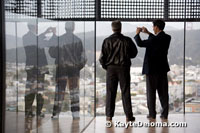 Golden Gate Park when the funnel-shaped 8-story tower was built as part of the new building that opened in 2005. The glassed-in Observation Floor gives you a 360 degree view over the park to the ocean. The tops of downtown skyscrapers can be seen over the neighborhoods to the east and the distinctive orange tips of the Golden Gate peak out above the lush green rise of the Presidio to the north. To the southeast, you can see the construction progress on the new California Academy of Sciences building, scheduled to be completed in 2008.
Golden Gate Park when the funnel-shaped 8-story tower was built as part of the new building that opened in 2005. The glassed-in Observation Floor gives you a 360 degree view over the park to the ocean. The tops of downtown skyscrapers can be seen over the neighborhoods to the east and the distinctive orange tips of the Golden Gate peak out above the lush green rise of the Presidio to the north. To the southeast, you can see the construction progress on the new California Academy of Sciences building, scheduled to be completed in 2008.
The View Inside the Legion of Honor
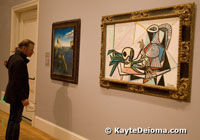 The classic colonnade of the Legion of Honor is an appropriate entrance to the Fine Art Museums’ collection of European art from ancient times through the 20th century. Here you will find Greek, Etruscan and Roman artifacts and their Egyptian predecessors. The Dutch and Flemish Masters of the 17th century give way to the neoclassical works of the 18th century and the early impressionists in the 19th century culminating in the requisite Picasso, Monet and Dali in the 20th century. Other highlights include Medieval French tapestries, 17th century decorative arts, and 18th to 20th century porcelain.
The classic colonnade of the Legion of Honor is an appropriate entrance to the Fine Art Museums’ collection of European art from ancient times through the 20th century. Here you will find Greek, Etruscan and Roman artifacts and their Egyptian predecessors. The Dutch and Flemish Masters of the 17th century give way to the neoclassical works of the 18th century and the early impressionists in the 19th century culminating in the requisite Picasso, Monet and Dali in the 20th century. Other highlights include Medieval French tapestries, 17th century decorative arts, and 18th to 20th century porcelain.
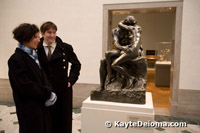 The Legion has one of the most impressive collections of Rodin sculptures in the world, with over 80 pieces on display. The Thinker greets you in the courtyard before you even enter the museum. There are three large galleries and two additional alcoves dedicated to Rodin’s work. Other museums may have more of his large scale bronze pieces, but here you can see the development of the artist through his use of stone, plaster and bronze and the detail of tiny figures to larger than life stone portraits. Some of the more famous works on display are The Kiss, The Three Shades and The Prodigal Son as well as a small-scale modčle of the Burghers of Calais.
The Legion has one of the most impressive collections of Rodin sculptures in the world, with over 80 pieces on display. The Thinker greets you in the courtyard before you even enter the museum. There are three large galleries and two additional alcoves dedicated to Rodin’s work. Other museums may have more of his large scale bronze pieces, but here you can see the development of the artist through his use of stone, plaster and bronze and the detail of tiny figures to larger than life stone portraits. Some of the more famous works on display are The Kiss, The Three Shades and The Prodigal Son as well as a small-scale modčle of the Burghers of Calais.
The View Inside the de Young
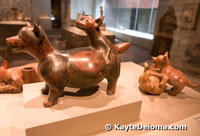 The Legion of Honor covers Europe; the rest of the world is at the de Young. It takes a bit of getting used to transitioning from American classics like John Singer Sargent and Mary Cassatt to the tribal arts of Africa to pre-Hispanic crafts and Mesoamerican architectural icons. Once you wrap your mind around the culture contrast, it becomes an adventure in artistic diversity.
The Legion of Honor covers Europe; the rest of the world is at the de Young. It takes a bit of getting used to transitioning from American classics like John Singer Sargent and Mary Cassatt to the tribal arts of Africa to pre-Hispanic crafts and Mesoamerican architectural icons. Once you wrap your mind around the culture contrast, it becomes an adventure in artistic diversity.
There’s a certain sense of playfulness to be found in three-thousand-year-old Olmec crawling baby sculptures, two-thousand-year-old pre-Columbian mating dogs and Flora Mace and Joey Kirkpatrick’s giant blown glass Fruit Still Life from 1997.
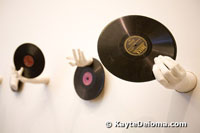 There is also an air of social commentary in such diverse pieces as Mildred Howard’s vinyl and plaster exposé on racism in the early music industry,Switchin’ in the Kitchen, William Gropper’s portrayal of politicians as monstrous green creatures in his painting, Senate Hearing, or Cornelia Parker’s moving Anti-Mass, a 3-D explosion of suspended debris constructed of the burned remains of a Southern Black Baptist church destroyed by arsonists.
There is also an air of social commentary in such diverse pieces as Mildred Howard’s vinyl and plaster exposé on racism in the early music industry,Switchin’ in the Kitchen, William Gropper’s portrayal of politicians as monstrous green creatures in his painting, Senate Hearing, or Cornelia Parker’s moving Anti-Mass, a 3-D explosion of suspended debris constructed of the burned remains of a Southern Black Baptist church destroyed by arsonists.
A Culinary View
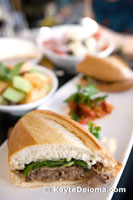 The cafes at both the Legion of Honor and de Young are both operated by Bon Apetit Management Company – no relation to the magazine. The Legion of Honor Café is located downstairs and has a quieter, more intimate atmosphere. At the de Young, the Café is on the main level with an outdoor terrace. The glassed-in interior is painted in the same shade of green as the surrounding evergreens, providing a harmonious transition between the inside and outside view.
The cafes at both the Legion of Honor and de Young are both operated by Bon Apetit Management Company – no relation to the magazine. The Legion of Honor Café is located downstairs and has a quieter, more intimate atmosphere. At the de Young, the Café is on the main level with an outdoor terrace. The glassed-in interior is painted in the same shade of green as the surrounding evergreens, providing a harmonious transition between the inside and outside view.
Since they share the same executive chef, the menus at both restaurants are similar, featuring primarily unique variations on sandwiches – like Thai ginger beef – and organic salads. All dishes are created with local ingredients, and although you place your order at the counter, the food is prepared fresh on demand. You can eat at the café without paying the museum admission if you’re not visiting the museum.
The Legion of Honor is included in the Go San Francisco Card  . Once you get your Legion of Honor ticket with the card, you can also get in free the same day to the de Young.
. Once you get your Legion of Honor ticket with the card, you can also get in free the same day to the de Young.
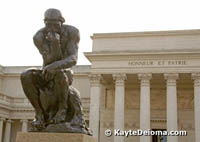
Legion of Honor
Lincoln Park
34th Avenue & Clement Street
San Francisco, CA 94121
(415) 863-3330
www.thinker.org
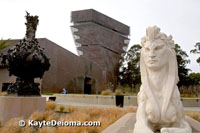 de Young
de Young
Golden Gate Park
50 Hagiwara Tea Garden Drive
San Francisco, CA 94118
Cross streets are John F. Kennedy Drive and Martin Luther King Jr. Drive.
(415) 863-3330
www.thinker.org
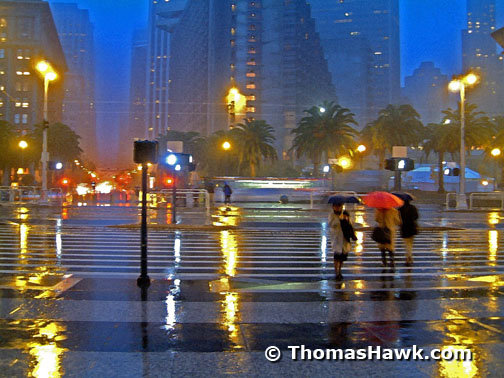
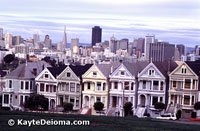 San Francisco is known more for its fog than rain. They do get their share of wet weather, but not as much as you might expect. With an average of 62 days of precipitation per year – most of those falling between November and March – they are well below the national average of 117.
San Francisco is known more for its fog than rain. They do get their share of wet weather, but not as much as you might expect. With an average of 62 days of precipitation per year – most of those falling between November and March – they are well below the national average of 117.
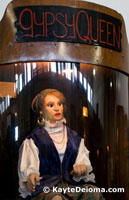 The Musče Mčcanique is a great place to entertain yourself and the kids for a rainy hour or a day depending on how many quarters you’re willing to part with. Even if you’re not a fan of the usual arcade games, you can admire the craftsmanship of the antique mechanical wonders and read up on the history of carnival and beach boardwalk culture.
The Musče Mčcanique is a great place to entertain yourself and the kids for a rainy hour or a day depending on how many quarters you’re willing to part with. Even if you’re not a fan of the usual arcade games, you can admire the craftsmanship of the antique mechanical wonders and read up on the history of carnival and beach boardwalk culture.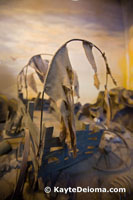 You can have your fortune told by a wizard or a carnival gypsy, have your palm read by the Mystic Ray or let the Kiss-O-Meter tell you just how hot you are in a range from blah to burning to uncontrollable. For a quarter, the Mystic Ray tells me “You are very prudent, never taking a move without lengthy deliberation
”
You can have your fortune told by a wizard or a carnival gypsy, have your palm read by the Mystic Ray or let the Kiss-O-Meter tell you just how hot you are in a range from blah to burning to uncontrollable. For a quarter, the Mystic Ray tells me “You are very prudent, never taking a move without lengthy deliberation
”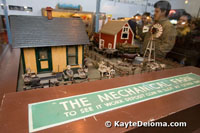 Most of the mechanical tableaus were much grander and had lots of action going on. A carnival scene has hundreds of moveable parts that come to life with the insertion of a few quarters. The Ferris wheel turns; sideshow characters come to life and jungle animals perform. The Unbelievable Mechanical Farm is even more complex with farm animals, a saw mill, hay barn and dozens of characters doing everything from plowing to shoveling coal, from baling hay to reading the newspaper with lots of folks just sitting around chatting.
Most of the mechanical tableaus were much grander and had lots of action going on. A carnival scene has hundreds of moveable parts that come to life with the insertion of a few quarters. The Ferris wheel turns; sideshow characters come to life and jungle animals perform. The Unbelievable Mechanical Farm is even more complex with farm animals, a saw mill, hay barn and dozens of characters doing everything from plowing to shoveling coal, from baling hay to reading the newspaper with lots of folks just sitting around chatting.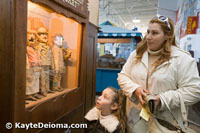 Puppets in glass cases dance, sing and ring bells. A whole array of mechanical instruments and music boxes from the turn of the century play a wide variety of tunes – so many in fact that there are three CDs of tunes played on these instruments available in the gift shop or online. Some are straightforward player pianos, others, like the Orchestrion, include a multitude of instruments within a single case.
Puppets in glass cases dance, sing and ring bells. A whole array of mechanical instruments and music boxes from the turn of the century play a wide variety of tunes – so many in fact that there are three CDs of tunes played on these instruments available in the gift shop or online. Some are straightforward player pianos, others, like the Orchestrion, include a multitude of instruments within a single case.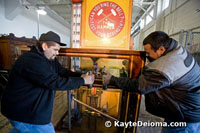 two opponents against each other operating a precursor to Rock’em Sock’em Robots. In the Marathon Cycle Race, two players race bicycles around a vertical track. In Zelinsky’s own 1989 creation, The Hammer, two people can match strength by trying to use a lever to lift a heavy hammer and ring a bell. An Arm Wrestling machine warns of the mechanical arm’s “superhuman strength” and gives you two tries to best the machine for a quarter. There are also more modern games of agility, speed and ingenuity from a Pirates of the Caribbean pinball machine, to early Atari arcade games and Super Chexx table hockey.
two opponents against each other operating a precursor to Rock’em Sock’em Robots. In the Marathon Cycle Race, two players race bicycles around a vertical track. In Zelinsky’s own 1989 creation, The Hammer, two people can match strength by trying to use a lever to lift a heavy hammer and ring a bell. An Arm Wrestling machine warns of the mechanical arm’s “superhuman strength” and gives you two tries to best the machine for a quarter. There are also more modern games of agility, speed and ingenuity from a Pirates of the Caribbean pinball machine, to early Atari arcade games and Super Chexx table hockey.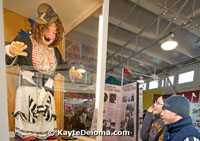 A lot of the machines are too tall for little kids to play easily, but the traditional mechanical horse is always popular and there are step stools around to give the little ones a boost. Some of the machines are definitely PG – especially the giant Laffing Sal and her smaller laughing buddies who have been giving kids nightmares and inspiring horror films for generations.
A lot of the machines are too tall for little kids to play easily, but the traditional mechanical horse is always popular and there are step stools around to give the little ones a boost. Some of the machines are definitely PG – especially the giant Laffing Sal and her smaller laughing buddies who have been giving kids nightmares and inspiring horror films for generations. The Legion of Honor has commanded its impressive view from Lincoln Park since Alma de Brettville Spreckles gave it to the people of San Francisco in 1924 in honor of the Californians who lost their lives in WWI. A few steps to the north of the parking lot, a path looks out from the park to reveal a striking panorama of Mt. Tamalpais and the Golden Gate Bridge. To the west, Cypress trees frame a foggy view of the Pacific Ocean, like a Chinese painting hung over the city’s oldest municipal golf course.
The Legion of Honor has commanded its impressive view from Lincoln Park since Alma de Brettville Spreckles gave it to the people of San Francisco in 1924 in honor of the Californians who lost their lives in WWI. A few steps to the north of the parking lot, a path looks out from the park to reveal a striking panorama of Mt. Tamalpais and the Golden Gate Bridge. To the west, Cypress trees frame a foggy view of the Pacific Ocean, like a Chinese painting hung over the city’s oldest municipal golf course. Golden Gate Park when the funnel-shaped 8-story tower was built as part of the new building that opened in 2005. The glassed-in Observation Floor gives you a 360 degree view over the park to the ocean. The tops of downtown skyscrapers can be seen over the neighborhoods to the east and the distinctive orange tips of the Golden Gate peak out above the lush green rise of the Presidio to the north. To the southeast, you can see the construction progress on the new California Academy of Sciences building, scheduled to be completed in 2008.
Golden Gate Park when the funnel-shaped 8-story tower was built as part of the new building that opened in 2005. The glassed-in Observation Floor gives you a 360 degree view over the park to the ocean. The tops of downtown skyscrapers can be seen over the neighborhoods to the east and the distinctive orange tips of the Golden Gate peak out above the lush green rise of the Presidio to the north. To the southeast, you can see the construction progress on the new California Academy of Sciences building, scheduled to be completed in 2008. The classic colonnade of the Legion of Honor is an appropriate entrance to the Fine Art Museums’ collection of European art from ancient times through the 20th century. Here you will find Greek, Etruscan and Roman artifacts and their Egyptian predecessors. The Dutch and Flemish Masters of the 17th century give way to the neoclassical works of the 18th century and the early impressionists in the 19th century culminating in the requisite Picasso, Monet and Dali in the 20th century. Other highlights include Medieval French tapestries, 17th century decorative arts, and 18th to 20th century porcelain.
The classic colonnade of the Legion of Honor is an appropriate entrance to the Fine Art Museums’ collection of European art from ancient times through the 20th century. Here you will find Greek, Etruscan and Roman artifacts and their Egyptian predecessors. The Dutch and Flemish Masters of the 17th century give way to the neoclassical works of the 18th century and the early impressionists in the 19th century culminating in the requisite Picasso, Monet and Dali in the 20th century. Other highlights include Medieval French tapestries, 17th century decorative arts, and 18th to 20th century porcelain. The Legion has one of the most impressive collections of Rodin sculptures in the world, with over 80 pieces on display. The Thinker greets you in the courtyard before you even enter the museum. There are three large galleries and two additional alcoves dedicated to Rodin’s work. Other museums may have more of his large scale bronze pieces, but here you can see the development of the artist through his use of stone, plaster and bronze and the detail of tiny figures to larger than life stone portraits. Some of the more famous works on display are The Kiss, The Three Shades and The Prodigal Son as well as a small-scale modčle of the Burghers of Calais.
The Legion has one of the most impressive collections of Rodin sculptures in the world, with over 80 pieces on display. The Thinker greets you in the courtyard before you even enter the museum. There are three large galleries and two additional alcoves dedicated to Rodin’s work. Other museums may have more of his large scale bronze pieces, but here you can see the development of the artist through his use of stone, plaster and bronze and the detail of tiny figures to larger than life stone portraits. Some of the more famous works on display are The Kiss, The Three Shades and The Prodigal Son as well as a small-scale modčle of the Burghers of Calais. The Legion of Honor covers Europe; the rest of the world is at the de Young. It takes a bit of getting used to transitioning from American classics like John Singer Sargent and Mary Cassatt to the tribal arts of Africa to pre-Hispanic crafts and Mesoamerican architectural icons. Once you wrap your mind around the culture contrast, it becomes an adventure in artistic diversity.
The Legion of Honor covers Europe; the rest of the world is at the de Young. It takes a bit of getting used to transitioning from American classics like John Singer Sargent and Mary Cassatt to the tribal arts of Africa to pre-Hispanic crafts and Mesoamerican architectural icons. Once you wrap your mind around the culture contrast, it becomes an adventure in artistic diversity. There is also an air of social commentary in such diverse pieces as Mildred Howard’s vinyl and plaster exposé on racism in the early music industry,Switchin’ in the Kitchen, William Gropper’s portrayal of politicians as monstrous green creatures in his painting, Senate Hearing, or Cornelia Parker’s moving Anti-Mass, a 3-D explosion of suspended debris constructed of the burned remains of a Southern Black Baptist church destroyed by arsonists.
There is also an air of social commentary in such diverse pieces as Mildred Howard’s vinyl and plaster exposé on racism in the early music industry,Switchin’ in the Kitchen, William Gropper’s portrayal of politicians as monstrous green creatures in his painting, Senate Hearing, or Cornelia Parker’s moving Anti-Mass, a 3-D explosion of suspended debris constructed of the burned remains of a Southern Black Baptist church destroyed by arsonists. The cafes at both the Legion of Honor and de Young are both operated by Bon Apetit Management Company – no relation to the magazine. The Legion of Honor Café is located downstairs and has a quieter, more intimate atmosphere. At the de Young, the Café is on the main level with an outdoor terrace. The glassed-in interior is painted in the same shade of green as the surrounding evergreens, providing a harmonious transition between the inside and outside view.
The cafes at both the Legion of Honor and de Young are both operated by Bon Apetit Management Company – no relation to the magazine. The Legion of Honor Café is located downstairs and has a quieter, more intimate atmosphere. At the de Young, the Café is on the main level with an outdoor terrace. The glassed-in interior is painted in the same shade of green as the surrounding evergreens, providing a harmonious transition between the inside and outside view.
 de Young
de Young